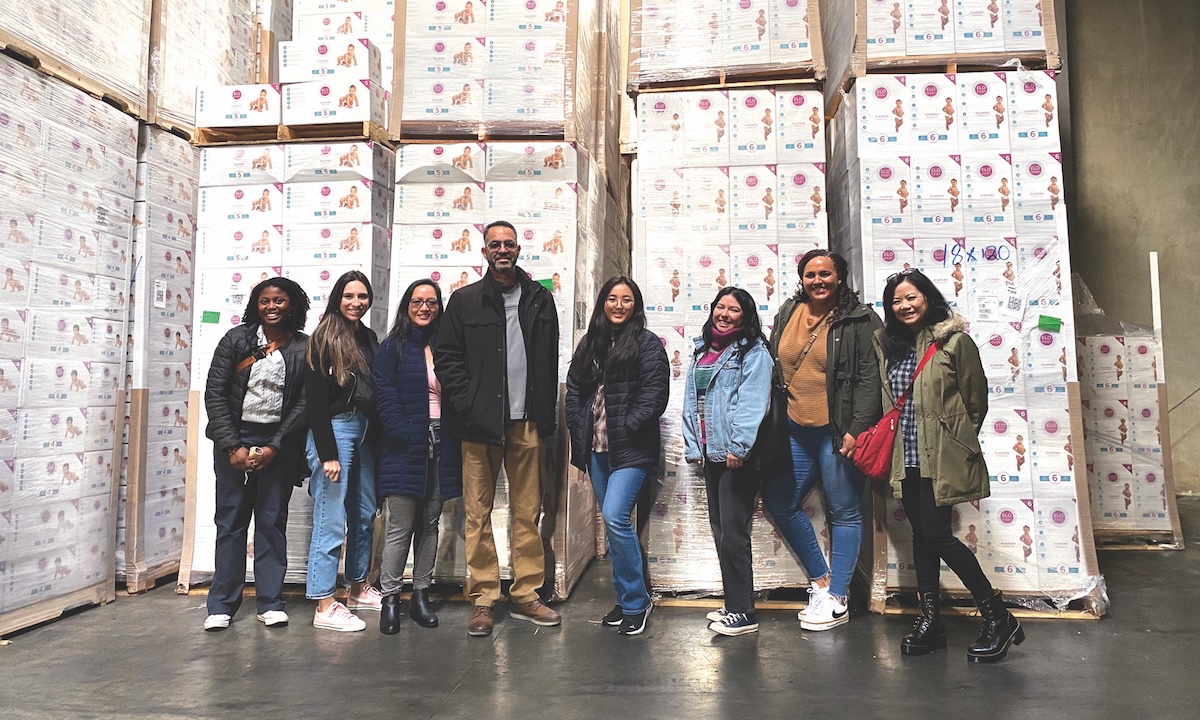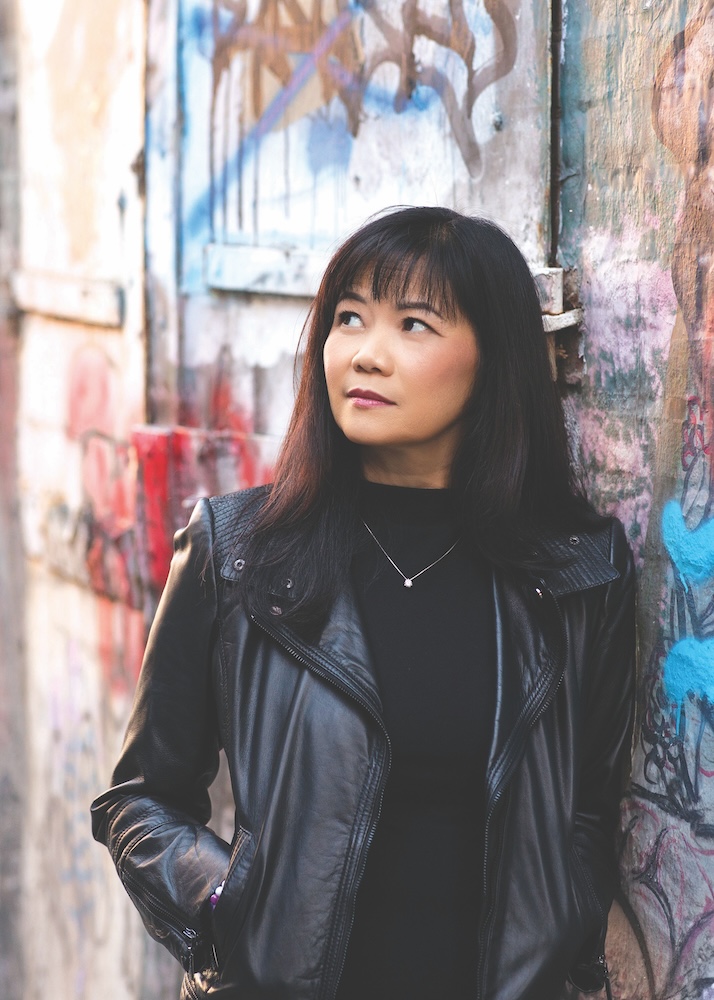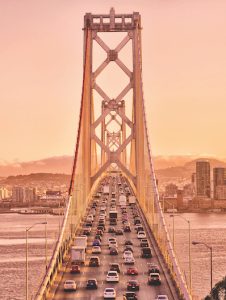Lisa Truong: Grassroots Philanthropy is a Real Baby Boom

Lisa Truong has always had a special place in her heart for society’s most vulnerable.
The longtime Bay Area resident who immigrated from Saigon as a toddler was struck by some of her Vietnamese relatives’ struggles to make ends meet in America.
Truong’s innovative nonprofit – now in its 15th year – has doled out tens of millions of clean diapers to mostly San Francisco Bay Area mothers in need.
Help a Mother Out has even inspired state assistance for diaper distribution that has become a model for other states.

The following is an abridged Q&A with Lisa Truong.
Q: What are you most passionate about?
Lisa Truong: I’ve only known the Bay Area to be my home since I was very young so I just care deeply about this community. Even though we are a vast metropolitan region, I really see all of our residents as one community. We may be siloed in terms of counties because it’s a multi-county region, but we’re so interconnected and interdependent upon one another. Someone who’s living in Contra Costa County may be working in San Mateo County, and I really am very passionate about bolstering the community. We have a lot of micro communities, but I do strongly feel that the Bay Area has a really great opportunity to be a healthy region and that means remembering that we’re all interconnected.
Q: What inspired you to get involved in
philanthropy?
A: I have always really cared about social causes since I was young. I grew up in the South Bay [when] there wasn’t a lot of diversity. Now, in Silicon Valley, it’s incredibly diverse and so from a very early age, I really cared about the vulnerable, and just different social causes. I went to Berkeley and was originally going to be a documentary filmmaker. That was my dream, and that actually didn’t end up working out because of the affordability index of the Bay Area. I ended up working in the nonprofit sector.
For a number of years, I worked at the Tides Foundation in operational roles, and it gave me a firsthand perspective. Seeing the meta impact that the foundation had on social causes and movements was really inspiring. My time at Tides Foundation really helped me appreciate the role that philanthropy had and actually propelling movements and causes, specifically the environmental movement, social justice movements, and even prior to that as an immigrant. Even though I came here as a toddler, I’ve always had that appreciation for working-class immigrant families. I had volunteered for an organization called Upwardly Global and that was really impactful because that was helping newly arrived immigrants who were highly skilled professionals really integrate into the workforce. So I think it’s just in my DNA that I care a lot about people.
Q: How did your nonprofit, Help a Mother Out, come to be?
A: In February 2009, I was a mom of a toddler and then a nine-month-old baby and I was watching an Oprah Winfrey Show and it was essentially about families really hard hit by the Great Recession. It was specifically profiling middle-class families in Sacramento and across California that had fallen on hard times. [Oprah] was like, “Well, you know, you can do something in your community during this time,” and we all knew that people in all the communities were really hurting, people who had never needed help before and that really inspired me because I just was in a situation where I had a young family, and I felt very blessed, even though certainly, I was a stay-at-home mom living on a one-income household. I still felt like in relative Silicon Valley/Bay Area terms, I felt like I had an abundance of things. I could go to Target, and I could pick anything that I wanted for my children.
A few days after that, I was having a rare night out with a mom friend of mine, Rachel Fudge, and I was talking to her about this episode and we just sort of got thinking, “What could we do? There’s so many families that are hurting.” That was sort of the impetus of, “Well, maybe we could do a clothing drive or a toy drive because kids go through toys and clothes like they’re drinking milk or formula” and after reaching out to a handful of Bay Area organizations that served families, we found out that they had a lot of clothing, and they had a lot of toys. I remember specifically touring a women’s center in West Oakland, and they showed us their storage room, and it was packed to the brim with toys. But what wasn’t in abundance were hygiene items, like diapers and feminine hygiene products. So we decided to pivot and do a Mother’s Day diaper drive.
Q: What impact have you seen that the diapers that you’re distributing are having on communities?
A: This is our 15th year. Honestly, it was a total accident to start this nonprofit. This was supposed to be a one-off diaper drive for a handful of organizations, and after finding out that diapers were not allowed under public assistance programs like food stamps and WIC (Women, Infants and Children Program) first, that was flabbergasting. That was like, “What? I cannot believe that families could not purchase diapers,” and so that was heartbreaking. And then, after sort of being dumbfounded by that fact, we just got really mad… We just felt like if two women who are socially aware in the Bay Area do not know about this omission in the safety net, then we need to spread the word and make an impact on that. And so [what] I’m really proud of [is] the organization has distributed – since our founding – over 66 million diapers, primarily in the Bay Area.
But what I’m most proud of is that in partnership with other advocates, state legislatures and city administrators, we have included diapers in the safety net in the city of San Francisco and in other communities across the State of California. So, it is our program, the San Francisco Diaper Bank [where] diapers are included in public assistance, and it’s still the only [such] program in the country that has fully integrated into public assistance programs. Any child under the age of two currently, who is eligible for CalWORKs, CalFresh, or Medi-Cal, can receive diapers. I’m very proud of that, and that our program inspired, in part, the State of California to allocate funding for diaper distribution across the state and has been a model for other states. It’s just a public policy win.
I’m very proud that we have been able to integrate our programs into the existing framework of good social service organizations that are already doing amazing work. We partner with public health departments. We partner with home visiting programs and I’m very proud if I think about the amount of lives that are changed, right? Like, not only are we putting money back into the hands of families that are struggling in this very high cost of living area, but we’re also putting money back into the community because their families have more money to spend on rent, on medicine, on groceries. And I feel really proud that … we are making an impact every day.
Q: What kind of impact has giving back had on your own children?
A: When they were younger [and] when this was a nascent organization and there would be diaper drives, literally, my kids would be helping me bring the diapers to my car, counting the diapers. So, it was a great learning tool for them to learn math.
As a mother, I’m very grateful that I had the opportunity to share philanthropy with them in their very early formative years so that’s just integrated in who they are as people. Our family has always given back in a very big way.And my oldest is going to UC Davis this year. He’ll be a freshman and his cause is climate change. He’s going to school to be a mechanical engineer, because he wants to be involved in climate change solutions.
Q: What other social issues are you most concerned about that are impacting the Bay Area?
A: At Help a Mother Out, we work to alleviate income inequality from not just a tactical level, but from a public policy level, so that is very close to my heart. I feel like, especially since the pandemic, that income inequality has grown so exponentially, and I wish that more folks could appreciate the struggles that so many working families are going through. I feel like it’s an invisible issue because our region is known for the great wealth and the money and the stock options and going public and I think that there was a lot more awareness during the pandemic.
And I would say that immigrant rights and just the plight of refugees and immigrants, that’s just a cause that is very close to my heart because I have seen relatives firsthand come to America and struggle, and I think that we are so fortunate to live in a culturally diverse region that it’s really important for us to remember that newcomers need supports because they are part of the community, and it just makes our community and economy healthier when we can support everybody.
Foster youth is [also] a cause that’s really close to my heart. It’s just so important because they don’t have as many resources or support, and especially foster youth who are aging out of the system. It’s important at any age to support youth, but to give young adults a fair start is incredibly crucial.
Q: So how can philanthropy best mobilize to address those three issues that you mentioned: income equality, immigration rights, and foster youth?
A: It’s really crucial that if you are in a position to help, that in addition to paying attention to what’s on trend – because there are trends in philanthropy – that you remember that giving back in your own backyard is crucial. International aid is important. Global climate change initiatives are incredibly important, and at the same time, it’s so important to remember that there are people in your own backyard that are struggling, and that if you are in a position that you’re fortunate enough to have benefited from the Bay Area economy, it’s incredibly important that you remember to give back.
Q: If you were hosting a small dinner party and inviting two or three noted California philanthropists or donors currently making an impact, who would you have over for your get together?
A: I just love Oprah. She has used her power for good, coming from humble beginnings and becoming a billionaire. I mean she could run for president if she wanted to, and she doesn’t have to do anything. I just really admire her as a human being.
Also, Beyoncé and Laurene Powell Jobs. Jobs is involved in local philanthropy and is certainly a powerhouse in philanthropic spaces so I just think that she would be a really interesting person to talk to about local issues, specifically in the Bay Area, and then Beyoncé. I mean, she’s Beyoncé. I’m a massive fan girl of Beyoncé, and I’m very inspired by her philanthropy. She’s also a mother and has such a cultural reach.
And I’m very inspired by both MacKenzie Scott and Melinda Gates insofar as their philanthropy. They’re giving unrestricted funds, which I hope is trending upward in philanthropy, because I think that’s really what’s most needed. Philanthropists need to trust the folks who are doing the work with managing the money.
